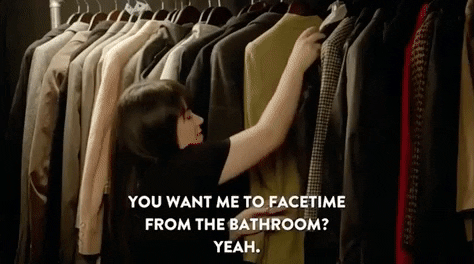
Looking out for your mates right now is more important than ever. The general vibe right now is just so ~heavy~, and keeping an eye on your friends’ moods and behaviours is crucial – even from a distance.
With job-loss widespread and financial pressures looming, those closest to us may be facing potentially dangerous situations in their relationships as a result of increased stress.
Some of these circumstances aren’t so easily discussed – Zoomers love keeping up a brave face as it is, but considering access to resources and help is restricted it’s best to try and be as honest as possible.
To help you look out for the safety of your friends, here are some potentially harmful circumstances they may be in right now – and how to pick up that they may be occurring.
Their partner may be withholding money from them.
Between changes to work hours and potential job-losses, money is massive stress for so many Aussies right now. As financial responsibilities may have changed, power dynamics in a relationship may have too. Instances of this could include one’s partner withholding or restricting money they would usually use to buy essential goods – this is a form of serious financial abuse.
Moo Baulch, Head of Customer Vulnerability, at CommBank says, “Financial abuse occurs when one partner uses money as a means to control or exploit their partner, and limit their financial freedom. It can also include sabotaging access to employment or education. While it is a form of domestic and family violence, it can occur even if your relationship is not physically abusive.”
Situations like this could yield long-term impacts, according to research, 90% of people who seek help for domestic and family violence are also affected by financial abuse at some point.
Typically, abusers use this tactic as a means to maintain power and control in a relationship, leading to vicious cycles in which the victim feels they can’t escape because they depend on the abuser.
“Unfortunately, the reality is that financial abuse is one of the most powerful ways that an abuser can keep their partner trapped in a relationship and it can even continue after a relationship ends”, says Baulch.
Money isn’t always easy to talk about, but if you know a friend who has recently lost their job due to COVID-19 or you think they might be in a difficult situation with their partner, opening a discussion (if you’re both comfortable, of course) around money could be a great way to have them open up.
Renate Field, a spokesperson from DVNSW (Domestic Violence NSW), believes keeping connected is a great step.
“Certainly keeping an eye on people and reaching out to let them know you’re available, can help. We may be socially distancing but you can always reach out and offer support.”
Their partner may be starting to show signs of verbal or physical abuse.
Spending 24/7 with a partner can be tough. You can slowly start to feel like the whole concept of “me time” is an absolute myth as the inability to escape the sound of their breathing slowly encroaches on your sanity.

However, there are some suffering serious implications of this increased time spent with a partner at home.
For those at high risk of experiencing verbal or physical abuse, the inability to access resources and help as they usually would may compromise their health and safety.
“It can be a complicated area and getting involved can sometimes make things worse,” says Feild on approaching the topic with care, especially if you know that a friend or family member might be going through something more sinister.
“It’s important to note that domestic and family violence services are open [during these times]. But if you’re concerned someone you know is experiencing violence or you’re worried about a neighbour and you think they could be harmed right now, always call the police.”
Resources like 1800RESPECT, Financial Counselling Australia (FCA), and Women’s Information and Referral Exchange (WIRE) are all currently available to provide support for those who may be struggling. Every state and territory has services that can provide support.
Their partner could be restricting them from talking to friends and family.
We’re all yearning for our usual social rituals right now. Whether it’s hanging out at the pub with mates or attending gigs, outings that once offered up a release from the day-to-day have dissipated.
It’s so important right now to create new rituals to connect – dusting off your Words With Friends account, Zoom trivia nights and Facetime banana bread baking sessions. Whilst they may seem lame in 5 years’ time once we’re back to business as usual, but, they’re all about connecting during this unprecedented time.

If a partner is restricting someone’s ability to virtually connect, checking phone messages or scouring DM’s, it’s a serious red flag as it showcases insecurity and total lack of trust.
If your pal is taking way longer than usual to respond or has disappeared from your regular IG tagging situation it could be time to enlist a more serious check-in. We’d also suggest taking a look at this guide on how to support a family member or friend going through domestic and family violence during COVID-19.
Unfortunately, instances of domestic and family violence often increase in times of crisis. The COVID-19 pandemic is no exception, with cases of financial abuse also likely to rise. To offer assistance to those experiencing this hardship, CommBank has produced a guide on the impact of the coronavirus and domestic and family violence, that also includes helpful information about financial abuse, pathways to support and useful suggestions about staying safe and staying connected.
If you or someone you know is affected by domestic violence, please call 1800 RESPECT (1800 737 732). In an emergency, call 000.



